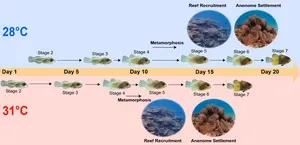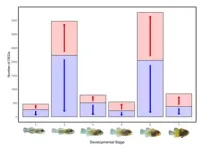(Press-News.org) Future ocean warming and marine heatwaves could impact the growth and development of clownfish during their earliest life stages, suggests a new study recently published in the journal, Science of The Total Environment.
A team of marine biologists from the Okinawa Institute of Science and Technology (OIST) reared the iconic coral reef fish in captivity at water temperatures of either 28°C or 31°C. Temperatures of 28°C represent current summer seawater temperatures in Okinawa, whilst temperatures of 31°C are reached during present-day marine heatwaves and are in line with the IPCC’s predictions of 3°C warming by 2100.
The scientists studied the clownfish, Amphiprion ocellaris, for 20 days after hatching – a crucial period of development that has been understudied in respect to climate change. They found that in warmer temperatures, the larvae grew faster, had higher metabolic rates, and showed changes in the activity of certain genes.
“Most climate change studies have focused on adult or juvenile clownfish,” said Billy Moore, first author and PhD student in the OIST Marine Climate Change Unit, led by Professor Timothy Ravasi. “By focusing on the larval stages, we can get a more complete picture of how clownfish could be impacted by warming oceans and climate change.”
During the first 20 days, clownfish pass through seven developmental stages, which, in the wild, are marked by distinct changes in location and behavior. Immediately after hatching, clownfish larvae are carried away from their home reef and into the open ocean. After roughly ten days, the clownfish reach stage four, which is when metamorphosis occurs and the fish start to develop their iconic orange-white colors. At around day 14, the clownfish, now in the fifth stage of development, find a new reef, and at stage six, seek out and settle into an anemone host.
In the study, the scientists imaged and measured the clownfish larvae over a 20-day period to determine their larval stage, and conducted trials to investigate metabolism. The team found that larvae reared at 31°C hit developmental milestones, such as metamorphosis, around two days earlier than those raised at 28°C. They also found that average metabolic rates for larvae were higher, likely driving the faster growth rates.
However, predicting how faster development could impact the survival of clownfish under future warming is very difficult.
Moore explained: “On one hand, the majority of clownfish do not survive the larval period due to predation, so shortening this time could increase their chances of survival and settlement. On the other hand, faster development may mean the clownfish disperse to new reefs less effectively, and the larvae may not be able to take in sufficient food to meet their increased energy demands.”
The research team also investigated the activity of clownfish genes at each stage of development.
“Overall, we saw a really strong molecular response to warming,” said Moore. “At every stage, many genes – more than 450 – either increased or decreased in activity.”
When the researchers looked into the functions of genes that had altered activity, they found that in clownfish raised at 31°C, genes associated with heat-stress were more active from the earliest developmental stages.
In stage seven, the researchers also saw a decrease in the activity of genes involved in neurotransmission, which means that warmer temperatures could potentially lead to changes in clownfish behavior.
The researchers also found evidence to suggest that raising the clownfish in warmer temperatures changes the “epigenome” of the clownfish. The epigenome, Moore explained, refers to chemical alterations made across the genome, either directly to the DNA or to proteins associated with the DNA. These chemical changes, known as epigenetic modifications, affect how the DNA is packaged into chromosomes, which determines how active genes are.
In the clownfish raised at 28°C, genes involved in epigenetic modification were highly active in stages three and six. However, in clownfish raised at 31°C the team did not observe the same activity, suggesting that these epigenetic modifications may be reduced at higher temperatures.
“We are now beginning experiments to study how the epigenome differs between clownfish raised at 31°C compared to 28°C. This could have really important implications as epigenetic changes laid down in the early stages of development impact how individuals respond to changes and stresses in the environment during their adult life,” said Moore.
END
In hot water: Ocean warming impacts growth, metabolic rate and gene activity of newly hatched clownfish
The oceans are heating up, and just 3°C of warming could significantly impact the development and growth of clownfish larvae, a new study finds
2023-03-20
ELSE PRESS RELEASES FROM THIS DATE:
Researchers study the impact of cancer on Hispanic patients and their caregivers
2023-03-20
Cancer, in all of its forms, is a public health concern responsible for more than 8 million deaths each year in the United States. In addition to its effect on patients and the health care system in general, cancer also places a burden on non-professional caregivers such as family members and friends. This can be especially true for the Hispanic population, where communication barriers, financial difficulties and sociocultural issues can be significant.
In a recently published review article, Jasbir ...
Workers' and bosses' trust in teleworking is key
2023-03-20
In recent years, teleworking – spurred by the implementation of information and communication technologies and the recent pandemic, particularly – has become a feature of many jobs. Many companies have now made this form of working available to their employees, but it is still far from common practice in today's labour market.
Universitat Oberta de Catalunya (UOC) researchers have analysed the different perspectives and perceptions on teleworking, looking at the wide range of ...
First detection of neutrinos made at a particle collider
2023-03-20
A team including physicists of the University of Bern has for the first time detected subatomic particles called neutrinos created by a particle collider, namely at CERN’s Large Hadron Collider (LHC). The discovery promises to deepen scientists’ understanding of the nature of neutrinos, which are among the most abundant particles in the universe and key to the solution of the question why there is more matter than antimatter.
Neutrinos are fundamental particles that played an important role in the early phase of the universe. They are key to learn more about the fundamental ...
Coffee plantations limit birds’ diets
2023-03-20
Cast your mind back to the spring of 2020, when grocery store shelves sat bare of essential items and ingredients. For birds who live in the forests of Central America, replacement of forest land with coffee plantations essentially “clears out the shelves” of their preferred foods, causing them to shift their diets and habitats to survive.
A new study led by researchers at the University of Utah explores a record of birds’ diets preserved in their feathers and radio tracking of their movements to find that birds eat far fewer invertebrates ...
Researchers identify key source of T cell "exhaustion"
2023-03-20
Custom-made to attack cancer cells, CAR T-cell therapies have opened a new era in the treatment of human cancers, particularly, in hematologic malignancies. All too often, however, they display a frustrating trait inherited from the body's own immune system cells: a drastic loss of cancer-fighting fervor known as "exhaustion”. Exhaustion is not only seen in cancer-fighting T cells but is also frequent in the setting of viral infections, such as human immunodeficiency virus (HIV), hepatitis B/C viruses (HBV, HCV) and COVID-19 (SARS-CoV-2).
The lapse into listlessness has diminished the effectiveness of CAR T-cell therapies in some patients and prompted scientists to try ...
How do we make farming better for the planet? Ask women
2023-03-20
When a family of five-ton elephants stomps and chomps its way through your crops, there’s only one winner. And in the central African nation of Gabon, farmers are getting fed up with the giant animals trampling their fields—and their livelihoods.
In conservation terms, Gabon is a success story—protected areas and tough anti-poaching measures have allowed the numbers of critically endangered African forest elephants to stabilize. But with food prices rising, anti-elephant protests have been spiking too. “Some people cannot farm anymore—the elephants are eating so much of their crops,” Gabon’s environment minister ...
Biological BMI: ISB researchers dig deep into data to determine better measures of metabolic health
2023-03-20
SEATTLE – Institute for Systems Biology (ISB) researchers have constructed biological body mass index (BMI) measures that offer a more accurate representation of metabolic health and are more varied, informative and actionable than the traditional, long-used BMI equation. The work was published in the journal Nature Medicine.
For decades, clinicians have relied on BMI as a crude tool to classify individuals as underweight, normal weight, overweight or obese. BMI scores are calculated by dividing a person’s weight in kilograms by height in meters squared. About 30 percent of the population is misclassified by this approach. Despite its limitations, ...
Monell Center team discovers molecular basis for alkaline taste
2023-03-20
PHILADELPHIA (March 20, 2023) – The sense of taste is among the first to come into contact with food before we ingest it, but whether animals can taste basic or alkaline food and how they do it remained unclear until now. A research group led by Yali Zhang, PhD, Principal Investigator at the Monell Chemical Senses Center, recently addressed this significant question, as they similarly did for sour taste in 2021 on the lower end of the pH scale. Their work, published today in Nature Metabolism and highlighted in Nature, identified a previously unknown chloride ...
Scientists open door to manipulating ‘quantum light’
2023-03-20
For the first time, scientists at the University of Sydney and the University of Basel in Switzerland have demonstrated the ability to manipulate and identify small numbers of interacting photons – packets of light energy – with high correlation.
This unprecedented achievement represents an important landmark in the development of quantum technologies. It is published today in Nature Physics.
Stimulated light emission, postulated by Einstein in 1916, is widely observed for large numbers of photons and laid the basis for the invention of the laser. With this research, stimulated emission has now been observed for single photons.
Specifically, ...
Muscle health depends on lipid synthesis
2023-03-20
Muscle degeneration, the most prevalent cause of frailty in hereditary diseases and aging, could be caused by a deficiency in one key enzyme in a lipid biosynthesis pathway. Researchers at the Institute of Molecular Biotechnology (IMBA) of the Austrian Academy of Sciences characterize how the enzyme PCYT2 affects muscle health in disease and aging in laboratory mouse models. The findings are published on March 20 in Nature Metabolism.
Muscle degeneration in inherited diseases and aging affects hundreds of millions of people ...
LAST 30 PRESS RELEASES:
New study from Jeonbuk National University finds current climate pledges may miss Paris targets
Theoretical principles of band structure manipulation in strongly correlated insulators with spin and charge perturbations
A CNIC study shows that the heart can be protected during chemotherapy without reducing antitumor efficacy
Mayo Clinic study finds single dose of non-prescribed Adderall raises blood pressure and heart rate in healthy young adults
Engineered immune cells show promise against brain metastases in preclinical study
Improved EV battery technology will outmatch degradation from climate change
AI cancer tools risk “shortcut learning” rather than detecting true biology
Painless skin patch offers new way to monitor immune health
Children with poor oral health more often develop cardiovascular disease as adults
GLP-1 drugs associated with reduced need for emergency care for migraine
New knowledge on heritability paves the way for better treatment of people with chronic inflammatory bowel disease
Under the Lens: Microbiologists Nicola Holden and Gil Domingue weigh in on the raw milk debate
Science reveals why you can’t resist a snack – even when you’re full
Kidney cancer study finds belzutifan plus pembrolizumab post-surgery helps patients at high risk for relapse stay cancer-free longer
Alkali cation effects in electrochemical carbon dioxide reduction
Test platforms for charging wireless cars now fit on a bench
$3 million NIH grant funds national study of Medicare Advantage’s benefit expansion into social supports
Amplified Sciences achieves CAP accreditation for cutting-edge diagnostic lab
Fred Hutch announces 12 recipients of the annual Harold M. Weintraub Graduate Student Award
Native forest litter helps rebuild soil life in post-mining landscapes
Mountain soils in arid regions may emit more greenhouse gas as climate shifts, new study finds
Pairing biochar with other soil amendments could unlock stronger gains in soil health
Why do we get a skip in our step when we’re happy? Thank dopamine
UC Irvine scientists uncover cellular mechanism behind muscle repair
Platform to map living brain noninvasively takes next big step
Stress-testing the Cascadia Subduction Zone reveals variability that could impact how earthquakes spread
We may be underestimating the true carbon cost of northern wildfires
Blood test predicts which bladder cancer patients may safely skip surgery
Kennesaw State's Vijay Anand honored as National Academy of Inventors Senior Member
Recovery from whaling reveals the role of age in Humpback reproduction
[Press-News.org] In hot water: Ocean warming impacts growth, metabolic rate and gene activity of newly hatched clownfishThe oceans are heating up, and just 3°C of warming could significantly impact the development and growth of clownfish larvae, a new study finds









